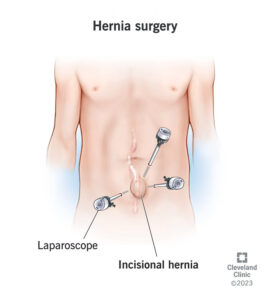Hernia
Surgery is the most common treatment for a hernia. With a hernia, an organ pushes through the muscle or tissue wall that holds it. Most hernias form in your abdomen or groin. Hernia surgery allows your surgeon to push the organ and herniated tissue back into place and reinforce the barrier holding it there using stitches or surgical mesh.
Another name for hernia surgery is herniorrhaphy.

Who needs hernia repair?
Not all hernias require immediate treatment, but most eventually do since they usually worsen over time. Hernias can create bulges where interior tissue presses outward through a tear or gap in a muscle or tissue wall. They can also cause unpleasant symptoms, like pressure, discomfort or pain. Depending on where your hernia’s located, it can impact other organs and cause complications.
For example, if you have testicles, a hernia can slip past a muscle wall and into your scrotum, causing swelling, pain during sex or other issues.
If a hernia causes symptoms or puts you at risk of a complication, you may need surgery.
Anesthesia
————————-
Minimum Stay
1 Day
————————-
Duration Of Operation
1 hour
————————-
